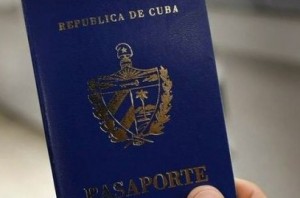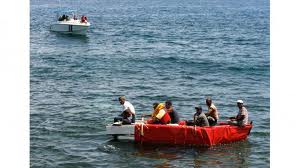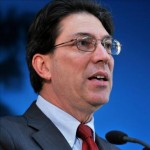Although in general the political jobs have degraded at planetary level, you always expect something better from a Foreign affairs chancellor. Say something about class and school, as the Chancellor is always the outside face of a State, the cabinet, or if you like the vase in the window. And so, when I read the Chronicle published acquiescent about a meeting of Foreign Minister Bruno Rodriguez (BR) with a group of emigrants elected at the headquarters of the United Nations office in Cuban-of “patriotic and respectful” – I felt somehow what might be called national shame.
And is that BR is not only the chancellor to expect refinements, but also a young politician in which one would like to find some sign innovator, even a flash to indicate that there is light at end of the tunnel. But none of this happened at the meeting in NY where the Chancellor Bruno pounded insistently always the same arguments, losing not only the opportunity to persuade, but also to take a good pose fingering the proposals they made, according to the Chronicle published, the emigrants’ patriotic and respectful. ”
It was a monologue of inaccuracies, falsehoods and fireworks with the beleaguered Chancellor tried to hide the tremendous problems it is having the Cuban political elite to agree on the proposal-and long-delayed immigration reform.
And that essentially encloses the disagreements, say tactics, about how to make migration economically, is in a rentier as now, or more intensive forms, such as investments. But the agreement also would say strategic conception about the immigration issue as a matter of utility, not rights. And while it must be presumed that the latter move-if you want to talk some modernization-just do it as timely administrative concessions, not de jure recognition.
For example, he says the chancellor about the amounts of capital that the country needs and that immigrants do not have, is a pointless soliloquy which I do not think anyone except the reporter ignored. Any municipality known technocrat Cuba requires a hundred million dollars, one hundred thousand and one hundred. In its spectacular financial hungry, it requires all, is to invest in a big way, in small or to survive. And unless the chancellor is autistic, you must know that this investment of one hundred thousand are still the “seed money” for many small and medium businesses on the island that are today the only growing source of jobs.
But beyond all this, the key problem is that the right of a Cuban to invest in their country can not depend on the amount of money you have. The amount of money given the real possibility of investing in a larger scale, buying a yacht or travel first, but can not give legal advantages over those with less money. That would be back to the early nineteenth century with censatarios systems. The economic wealth can not be a source of law. Something that seems to know no BR and respectful and patriotic Cubans ignored.
The same happens with the usual bag of good Cuban Cubans and other baddies. In the first, Cubans respectful and nationalists who were allowed to return from time to time with a final stamp on the passport that Foreign Minister Bruno considers immigration a revolution. In the second bag, the Batista torturers (Are there some things?), Terrorists and supporters of the blockade / embargo. And just to prevent the latter (which the reporter with full respect for the Chancellor’s speech called “recalcitrant”) is not allowed free access to none.
Quite a huge falsehood. First of all I must say that I know of dozens of cases of Cubans who have never been terrorists or Batista or torturers, even supporters of the Helms Burton, who were not allowed to visit the country of their birth, either because they do not placed the stamp of yore or because veer stamped at the airport and everything. But even if they were, and again back to the question of the sources of individual rights, it is not legitimate to expropriate some people their inalienable rights to prevent others from using them. If the Cuban government considers a national is guilty of an offense punishable, must proceed with prosecution if they enter the country, not prevent two million who may visit, or go back and live in the country of their birth.
And where appropriate, then we have to discuss whether to support the Helms Burton is or is not a crime, which in my view is a political mistake, but not a legal transgression. And by the way, and here I follow the logic of Chancellor Bruno, see the case of the comparisons, providing for punishment-if you want to treat it-for repressive and abusive thugs who swarmed in the Cuban political regime. Finally it should be recognized that Juanes albums crush on Calle Ocho is a game of wayward boys compared with the siege to the houses of opponents, the use of physical and verbal violence against them and their referrals to police stations for varying periods, all illegal.
In summary, the soliloquy Chancellor should force us to think more seriously about the commitment and call for immigration reform. It is not enthusiastically applauding every little move that the Cuban government made in its usual political miseries. The only path that can lead to a normalization of the relationship between the Government and emigration is returning expropriated rights point to the full freedom of movement for Cubans. To enter, exit and to move within their own country. The Cubans, regardless of ideology or political preferences, are entitled to live in the country of their birth, to comment and participate in public activities in accordance with applicable laws. And even, to change through democratic means. The party affiliation can not be a source of rights.
I think frankly that limiting our demands to a few points where surface rights and permissions are equated and confused, erroneous simplification is a much more complex.
Well, Cuba is now a transnational society and as such should be understood. There is no other way to deal with the complex future of the island and its diasporic sprawl. If the Chancellor Bruno and his court of respectful patriots know it or not, not really decisive. The most important thing now is that we understand it and act accordingly.
Sources:HaroldoDillaAlfonso/DR/InternetPhotos/TheCubanHistory.com
La Reform Migratoria en Cuba/The Cuban History/ Arnoldo Varona, Editor
SOBRE LA REFORMA MIGRATORIA EN CUBA
Aunque en general los oficios políticos se han degradado a nivel planetario, uno siempre espera de un canciller algo mejor. Digamos que algo de clase y de escuela, pues el canciller es siempre la cara externa de un Estado, la vitrina, o si se quiere el florero en la ventana. Y por eso, cuando leí la crónica aquiescente publicada sobre una reunión del Canciller Bruno Rodriguez (BR) con un grupo de emigrados elegidos en la sede de la oficina cubana en Naciones Unidas —de los “patriotas y respetuosos”—, sentí de alguna manera lo que se podría llamar vergüenza nacional.
Y es que BR no es solamente el canciller del que esperamos refinamientos, sino también un político joven en el que uno quisiera encontrar algún signo innovador, siquiera un destello que indique que hay luces al fondo del túnel. Pero nada de esto sucedió en la reunión de NY en la que el Canciller Bruno machacó con insistencia los mismos argumentos de siempre, perdiendo no solo la oportunidad de convencer, sino incluso de adoptar una buena pose manoseando las propuestas que le hicieron, según la crónica publicada, los emigrados “patriotas y respetuosos”.
Fue un monólogo de imprecisiones, falsedades y fuegos artificiales con los que el atribulado canciller intentó ocultar los tremendos problemas que está teniendo la élite política cubana para ponerse de acuerdo respecto a la propuesta —y siempre pospuesta— reforma migratoria.
Y que en lo esencial encierra las desavenencias, digamos que tácticas, acerca de cómo aprovechar económicamente a la migración, sea de una manera rentista como ocurre ahora, o de formas más intensivas, como son las inversiones. Pero también el acuerdo, diría que estratégico, acerca de concebir el tema migratorio como un asunto utilitario, no de derechos. Y aunque es presumible que habrá que mover estos últimos —si de alguna modernización quiere hablarse— solo hacerlo como concesiones administrativas puntuales, no como reconocimientos de jure.
Por ejemplo, lo que dice el canciller acerca de las cantidades de capitales que el país requiere y que los emigrados no tienen, es un soliloquio sin sentido al cual no creo que nadie más hizo caso excepto la cronista. Cualquier tecnócrata municipal sabe que Cuba requiere cien millones de dólares, cien mil y cien. En su espectacular hambre financiera, lo requiere todo, sea para invertir en lo grande, en lo pequeño o para sobrevivir. Y al menos que el canciller sea autista, debe conocer que esas inversiones de los cien mil están siendo el “dinero semilla” de muchos pequeños y medianos negocios en la Isla que son hoy la única fuente creciente de empleos.
Pero más allá de todo esto, el problema clave es que el derecho de un cubano a invertir dinero en su país no puede depender de la cantidad de dinero de que disponga. La cantidad de dinero le da la posibilidad real de invertirlo a mayor escala, comprar un yate o viajar en primera, pero no puede darle ventajas legales sobre quienes tienen menos dinero. Eso sería retroceder a los principios del siglo XIX con sus sistemas censatarios. La opulencia económica no puede ser fuente de derecho. Algo que parece que BR no sabe y que los cubanos respetuosos y patriotas pasaron por alto.
Lo mismo sucede con el consabido saco de cubanos buenos y otro de cubanos malos. En el primero, los cubanos respetuosos y nacionalistas a quienes se les permite regresar de vez en cuando con un sello definitivo en el pasaporte que el canciller Bruno considera toda una revolución migratoria. En el segundo saco, los batistianos torturadores (¿quedan algunos vivos?), los terroristas y los partidarios del bloqueo/embargo. Y justamente para prevenir a los segundos (a los que la cronista con pleno apego al discurso del canciller llama “los recalcitrantes”) es que no se permite el libre acceso a ninguno.
Toda una inmensa falsedad. Ante todo debo decir que yo conozco decenas de casos de cubanos que nunca han sido terroristas, ni batistianos, ni torturadores, ni siquiera partidarios de la ley Helms Burton, a quienes no se les permite visitar al país en que nacieron, sea porque no les colocan el sellito de marras o porque los viran en el aeropuerto con sello y todo. Pero aun cuando lo fuesen, y nuevamente vuelvo al asunto de las fuentes de los derechos individuales, no es legítimo expropiar a unas personas sus derechos inalienables para prevenir que otros los usen. Si el Gobierno cubano considera que un nacional es culpable de acto punible, debe proceder a su encausamiento si entra al país, no impedir a dos millones que puedan visitar, o regresar y vivir en el país en que nacieron.
Y cuando proceda, entonces tendremos que discutir si apoyar la Ley Helms Burton es o no un delito, lo cual desde mi punto de vista es un error político, pero no una transgresión legal. Y de paso, y aquí sigo la lógica del canciller Bruno, ver el asunto de las equiparaciones, que contemplen castigos —si de ello se quiere tratar— para los esbirros represivos y abusadores que han pululado en el régimen político cubano. Al final habría que reconocer que machacar discos de Juanes en la calle Ocho es un juego de muchachos díscolos en comparación con el asedio a las casas de los opositores, el uso de la violencia física y verbal contra ellos y sus remisiones a las estaciones de policía por plazos variables, todos ilegales.
En resumen, que el soliloquio del canciller debe obligarnos a pensar con mayor seriedad y compromiso acerca de la llamada reforma migratoria. No se trata de aplaudir con entusiasmo cada pequeña movida que el Gobierno cubano haga en sus acostumbradas miserias políticas. El único camino que puede conducir a una normalización de la relación entre el Gobierno y la emigración es devolviendo los derechos expropiados que apunten a la plena libertad de tránsito para los cubanos. Para entrar, para salir y para moverse dentro del propio territorio nacional. Los cubanos, no importa su ideología o preferencias políticas, tienen derecho a vivir en el país en que nacieron, a opinar y a participar en actividades públicas de acuerdo con las leyes vigentes. E incluso, para cambiarlas por las vías democráticas. La adscripción partidaria no puede ser fuente de derechos ciudadanos.
Creo francamente que limitar nuestras demandas a unos pocos puntos superficiales donde derechos y permisos son equiparados y confundidos, es una simplificación errónea de un asunto mucho más complejo.
Pues Cuba es ya una sociedad transnacional y como tal hay que entenderla. No hay otra manera de lidiar con el complejo futuro de la Isla y su desparrame diaspórico. Si el canciller Bruno y su corte de patriotas respetuosos lo saben o no, no es realmente decisivo. Lo más importante ahora es que lo entendamos nosotros y actuemos en consecuencia.
Sources:HaroldoDillaAlfonso/DR/InternetPhotos/TheCubanHistory.com
La Reform Migratoria en Cuba/The Cuban History/ Arnoldo Varona, Editor






